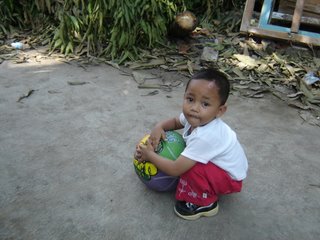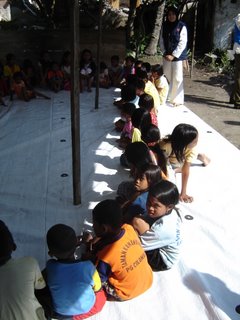Trip to School

It appears that the thirst for news about the earthquake has been slaked, a chilling point for the news market. Every disaster has an expiration date for the attention, the charity, and the compassion it can draw. In Jogjakarta, that’s come sooner than I expected. I’ve been told the earthquake coverage has been pre-empted in the U.S. by a story about a terrorist cell that was captured in Toronto. They had a lot of explosives. But they didn’t get a chance to use them. I would have to say it’s an important story, but I also have to say it’s about something that didn’t happen. It's worth thinking about how many of the news stories you read are about what is happening.
An example: there’s been a spike in coverage over concerns about post-earthquake bird flu outbreaks. You should know that many of the NGO workers and PR people I talked to are rolling their eyes over this particular news angle. Again, there have been no cases reported in the quake zone. Again, this story is about something that hasn’t happened. The worry is that people are sleeping in chicken coops because they’re the only safe structure around. The quotes on this story might actually come from the WHO, but it’s certainly not the organization’s first concern right now. Outbreaks of common diseases such as diarrhea or staph are much more likely to claim lives in an area still in need of clean water and sanitation. But at this point, that hasn’t happened either.
Here’s something that is happening. People are emotionally traumatized and they need help. For background, check out this story. I spent a morning with Red Cross volunteers (actually from a federation of Red Cross agencies like the Paling Mera, the American Red Cross, and the Red Crescent Societies), most of whom had just come from Aceh. They had started a small makeshift schoolroom for child survivors in a small village called Birin. 37 of its 3-500 residents died in the earthquake. We pulled over on the town’s main artery, walked into one of the capillaries, and over a wasteland of dusty rubble. Every adult was working – cleaning dishes in fish tank, hanging wash in the latticework of a collapsed barn, frying noodles in an open courtyard that used to be someone’s bedroom.

The volunteers gathered children from the village like pied pipers. Soon their tent was squirming with 50 or more excited little things. A volunteer told me one girl jumped up when she heard there was a school, and ran to a cabinet in the remains of her house. She pulled out a plastic Popeye backpack and held it up in triumph, though there wasn’t anything to put inside.
They sang songs and clapped – which is golden kind of tape for a radio story. They also drew pictures with crayons – most of them drew scenes with volcanoes – red lava spitting out the tops of triangles. Maybe I made more of that than I should have, but it certainly struck me as a barometer of their anxiety. The kids laughed and giggled and acted like kids. There should be a word for something that breaks your heart and lifts you up at the same time. I had to step away from the tent for a while to keep from getting teary. A lot of the kids had wounds – one shy 11-year-old boy showed up on crutches dragging a broken leg, and there was a happy toddler with a nasty looking head wound. Still, it seemed like a classroom, and the kids looked to me like they’re going to be okay.
As far as I can tell, psychological services like this really should arrive at the same time as the food and water. It should be integrated with the whole first responder basic needs package. In this terrible landscape of destruction, most people aren’t sleeping through the night. A professor at Sardjito Hospital said the Jogjakartans were showing a lot of physical manifestations of emotional trauma – like headaches and raised body temperatures. He said that’s because they tend to internalize stress more than other parts of the archipelago. There’s a local saying – if you loose your arm, thank god you’ve got one left. I read a great article that leads with another Javanese aphorism: everything is good luck. Sadly, eternal optimism comes at a price. It may be harder to get the anxiety out. It’s gotta get digested somehow. That’s what’s happening in Jogjakarta now.
